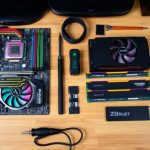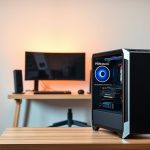Gaming PCs typically use 2.4 kilowatt-hours (kWh) of electricity daily.
During active gameplay, they consume about 0.4 kWh per hour.
These figures vary based on hardware and usage.

Gamers are becoming more aware of their environmental and financial impact.
Understandingpower usagehelps balance performance and efficiency.
Its crucial for both casual players and hardcore enthusiasts.

Energy consumption differs greatly between budget builds and high-performance rigs.
Each gaming PC has a unique power profile.
This can significantly affect monthly electricity bills.

Lets explore gaming PCpower usagein depth.
Well provide insights to help you make smarter choices.
Our goal is to create more sustainable gaming experiences.

To learn more about setting up your PC for gaming, check out thisstep-by-step guide.
It offers valuable tips for optimising your system.
They form a complex landscape of technological demand and electrical efficiency.

Related Posts:
ExploringPC energy usage factorsreveals fascinating insights.
It helps gamers make informed decisions about their setups.
This range fluctuates based on specific hardware and operational demands.
Power consumption isnt just about numbersits about understanding your machines unique energy ecosystem.
Gamers can use this knowledge to optimise their setups.
By understanding power consumption, users can create more efficient and cost-effective gaming systems.
They can significantly impact your monthly utility bills.
Understanding their energy use is crucial for managing costs.
These computers typically consume 200 to 500 watts during active use.
This translates to substantial electricity consumption over time.
Calculating electricity usage is vital for gamers looking to control their energy expenses.
A mid-range gaming PC can make a noticeable difference in your electric bill.
A mid-range gaming PC played for four hours daily can increase your electric bill by 6 to 8 monthly.
Electricity Consumption Breakdown
Gaming habits greatly affect electricity consumption.
Components That Impact Power Consumption
Gaming PC components vary in their energy needs.
Each part plays a role in the overallpower usage.
Understanding this is key for both performance and efficiency.
Several hardware elements stand out as primary energy consumers in gaming PCs.
Lets explore these key components and their power requirements.
Graphics Card Power Requirements
The graphics card is the most power-hungry component in a gaming PC.
Its energy use varies greatly based on performance tier.
CPU Energy Usage
Processors are crucial inenergy-efficient hardwareconsiderations.
Intel and AMD processors show different power consumption patterns.
Additional Hardware Power Considerations
Other components also contribute to overall power consumption.
These include motherboards, RAM, storage drives, and case fans.
Selectingenergy-efficient hardwarecan significantly reduce your gaming PCs power consumption and operational costs.
Gamers should balance component selections carefully.
This approach ensures optimal performance while keeping energy use in check.
Gaming PC Electricity Costs Across Different Regions
Gaming PC running expensesvary greatly worldwide.
Your location and energy pricing can significantly impact your gaming costs.
This regional variation offers intriguing insights into the financial aspects of gaming.
These figures highlight the stark contrast in energy costs across states.
Key factors influencinggaming PC running expensesinclude:
A typical gaming PC uses 400 to 800 kWh yearly.
PCs running for 5 hours daily consume about 730 kWh annually.
High-performance setups can reach1,600 kWh during extendedgaming sessions.
Knowing these regional costs helps gamers make smart choices.
It allows them to plan their gaming setup and consider energy-saving strategies effectively.
Tips for Reducing Gaming PC Power Consumption
Power efficiency is now crucial in gaming.
Gamers are finding clever ways to cut energy use whilst keeping their PCs powerful.
This addresses rising energy costs and environmental worries.
Smart power-saving tricks can slash your gaming rigs electricity use.
These methods wont harm your gaming experience.
Instead, theyll help you save money and energy.
Energy-Efficient Hardware Choices
Picking the right parts is key to lowering power use.
These help gamers save energy:
Smart power management isnt about limiting performance, but about intelligent energy use.
This also helps reduce their impact on the environment.
Conclusion
Gaming PC power consumption is a delicate balance between performance and energy use.
Understanding this balance reveals a new approach to digital entertainment.
High-end GPUs like NVIDIA RTX 4090 consume 450 watts, but gamers now have insights for efficiency.
Balancing performance and energy use is achievable.
Energy-efficient components and smart power-saving strategies can reduce monthly expenses.
Gamers can save 60 to 75 annually, making conscious computing economically and environmentally responsible.
Your gaming experience neednt sacrifice power for efficiency.
Careful component selection and understanding power requirements are key.
Adopting intelligent usage patterns helps create a high-performance setup with minimal energy consumption.
The future of gaming is green, smart, and exciting.
Your gaming PC is more than a machine; its a statement of technological sophistication.
It also shows environmental awareness.
Game on, sustainably.
FAQ
How much electricity does a typical gaming PC consume?
A gaming PC can use 300-500 watts during intense gameplay.
High-end systems might reach up to 750 watts.
Actual use depends on components, graphics card, and gaming intensity.
Do different graphics cards significantly impact power consumption?
Graphics cards are major energy users in gaming PCs.
Modern high-performance GPUs like NVIDIA RTX 4090 can draw up to 450 watts.
Mid-range cards might use 150-250 watts during demanding gaming sessions.
How can I reduce my gaming PCs electricity usage?
Use energy-efficient components and enable power-saving modes.
Upgrade to more efficient hardware and ensure proper ventilation.
These steps can help reduce overall power consumption.
What factors influence a gaming PCs power consumption?
CPU performance and graphics card capabilities are key factors.
Additional hardware like RGB lighting and cooling systems also affect power use.
Monitor size and the specific games or applications being run play a role too.
How do electricity costs for gaming PCs vary by region?
Electricity costs differ widely around the world.
In the UK, its about 0.15 per kilowatt-hour.
Countries with less developed energy systems often have higher rates.
These differences directly impact gaming PC running costs.
Can power supply efficiency ratings make a difference?
Power supply unit (PSU) efficiency ratings can significantly reduce electricity waste.
Ratings like 80 Plus Bronze, Gold, or Platinum indicate higher efficiency.
More efficient units convert more electrical input into usable power for your components.
How much does it cost to run a gaming PC daily?
Running a gaming PC can cost between 0.50 to 2 per day.
The exact cost depends on your systems setup and local electricity rates.
High-end systems may consume more during long gaming sessions.
Are laptops or desktops more energy-efficient for gaming?
Desktop gaming PCs typically use more power than laptops.
Gaming laptops are designed with more energy-efficient components.
They offer a compact and potentially less electricity-intensive alternative for gaming.
What are the most power-hungry PC components?
Graphics processing units (GPUs) and central processing units (CPUs) use the most electricity.
High-performance storage drives and cooling systems also consume significant power.
How can I monitor my gaming PCs power consumption?
Use software tools like MSI Afterburner to track real-time power usage.
Hardware monitoring applications and dedicated electricity meters can also help.
These tools can identify areas for energy optimisation.